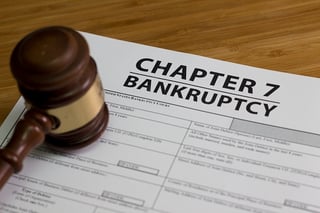Scura, Wigfield, Heyer, Stevens & Cammarota Blog
- Blog
Chapter 7 Bankruptcy and Its Effect on Owning A Home
 When contemplating bankruptcy, one of the biggest trepidations that people often have is how it will affect their home. Will the bankruptcy cause their home to be lost? Will the mortgage lender commence foreclosure as a result of the bankruptcy filing? What are the legal consequences of all those documents they signed when purchasing the home? This blog will explore those topics and how a bankruptcy will affect their home ownership.
When contemplating bankruptcy, one of the biggest trepidations that people often have is how it will affect their home. Will the bankruptcy cause their home to be lost? Will the mortgage lender commence foreclosure as a result of the bankruptcy filing? What are the legal consequences of all those documents they signed when purchasing the home? This blog will explore those topics and how a bankruptcy will affect their home ownership.
The Difference Between a Promissory Note and a Mortgage
At the time that you close on the sale of your property, your mortgage lender will have you sign a promissory note and mortgage instrument (amongst other documents that need to be signed at closing). The legal impact of the promissory note is that it obligates you to repay money loaned to you. Essentially, the promissory note is your legally binding promise to repay money lent and allows the lender to pursue you for a monetary recovery if you do not. The mortgage instrument on the other hand is the document that grants the lender a lien on the real estate and allows the lender to foreclose on the real estate in the event you don’t pay as agreed.
The Effect of a Chapter 7 Bankruptcy Discharge on the Promissory Note You Executed and a Mortgage
When an individual files a chapter 7 bankruptcy, that individual is seeking to obtain a bankruptcy discharge at the end of the proceeding. When you receive a bankruptcy discharge, you are relieved of your obligations to repay that debt which has been discharged. Therefore, the borrower no longer owes the money lent and the lender will not be able to pursue a debtor post-chapter 7 discharge for a monetary recovery. However, the lender will still have rights against the real property by virtue of the mortgage instrument. Thus, the lender can still foreclose against the property if there is a default under the terms of the loan. In the State of New Jersey, however, the mere fact that a borrower filed for bankruptcy is not cause for the lender to commence foreclosure, even if the promissory note or mortgage defined bankruptcy as a default. So long as payments continue to be made, the lender may not foreclose.
The Effect of a Chapter 7 Bankruptcy on Your Ability to Receive Mortgage Statements
Once the bankruptcy is filed, creditors are prohibited from trying to collect most debts, which includes sending a notice of the amount due on a loan with a demand to make payment. Mortgage lenders are oftentimes reluctant to send monthly mortgage statement out of a concern that such action could be viewed as a violation of the automatic stay. However, the Bankruptcy Court in the District of New Jersey issued a standing order for bankruptcy cases within the district to address this issue. The standing order allows secured creditors to send monthly statements in individual bankruptcy cases under chapters 7, 11 and 13 without being in violation of the automatic stay or in violation of the discharge order. As a result, individuals who file for bankruptcy in the District of New Jersey may continue receiving their monthly mortgage statements during and after their bankruptcy case.
The Effect of Chapter 7 Bankruptcy on Your Ability to Keep Your Home
Chapter 7 bankruptcy is the liquidation chapter of bankruptcy. This means that a trustee will inquire as to whether there are assets available to liquidate within the limitations set forth in the bankruptcy code. Under 11 U.S.C. § 522 of the bankruptcy code, a debtor is granted certain exemptions in property that he or she is permitted to keep despite filing for bankruptcy. The exemptions cover all types of property and in most cases, all property that a chapter 7 debtor owns is protected. As it pertains to a residence, the federal exemptions permit a debtor to exempt $23,675.00 in equity in real property from the bankruptcy estate. In the case of married couples filing a joint bankruptcy proceeding, that number can be doubled for a jointly owned residence. This means that after considering the estimated cost of sale and the allowed exemption, if there is no equity in property the trustee will not be able to sell the home. However, if after deduction of secured claims against the residence, the estimated cost of sale and the allowed exemption, there is still equity remaining, then that non-exempt equity is subject to recovery by the trustee.
Contact a Chapter 7 Bankruptcy Attorney for Help
A home is too important to not be well informed about your options. If you have questions about a chapter 7 bankruptcy and whether it is right for you, call the law firm of Scura, Wigfield, Heyer, Stevens & Cammarota for a free consultation.

David E. Sklar
Prior to joining Scura, Wigfield, Heyer, Stevens & Cammarota, LLP, David Sklar graduated from Rutgers University-Newark School of Law with a J.D., Cum Laude. Mr. Sklar was the recipient of a Pro Bono Award and was honored by the New Jersey Bar Association for his commitment to the Street Law Program by being awarded the Street Law Prize.
Share Article
Need Help? Contact Us Today!





Lists by Topic
- Bankruptcy (320)
- Personal Injury (93)
- Chapter 13 (52)
- Chapter 7 (50)
- Debt Management (50)
- Foreclosure (47)
- Accident (31)
- Car Accident (26)
- Chapter 11 (24)
- Business Bankruptcy (19)
- Credit (18)
- Insurance Claims (16)
- Business Law (12)
- Litigation (12)
- Employment Law (11)
- Probate and Estate Law (11)
- Damages (10)
- Medical (10)
- Product Liability (10)
- Workers Compensation (10)
- Attorney (9)
- Consumer Bankruptcy (9)
- Commercial & Residential Real Estate (6)
- Slip and Fall (6)
- Contracts (5)
- Premises Liability (5)
- Repossession (5)
- wrongful death (5)
- Video | Bankruptcy (4)
- Bankruptcy Cost (3)
- Corporate Litigation (3)
- Trial Law (2)
- student loans (2)
- tax (2)
- Attorney Fees (1)
- COVID-19 (1)
- Certified Civil Trial (1)
- Dog Bites (1)
- News (1)
- Relocation Assistance (1)

